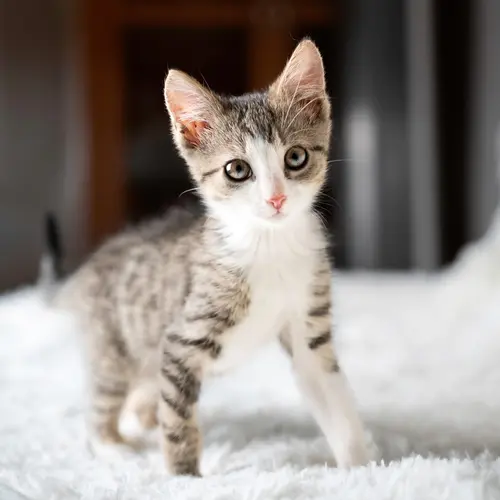Did you know that cats also suffer from gum diseases? The most common type in cats is called gingivitis. Humans and dogs also get this gum disease, but it tends to be more severe in cats. The symptoms usually involve more than swelling or bleeding in the mouth, and in extreme cases, the condition can be life-threatening.
What Is Cat Gingivitis?
Gingivitis is a cat dental disease often characterized by swelling of the gums. It is most commonly diagnosed in adult or elderly cats.
When bacteria mixed with food particles accumulate in the cat's mouth, it leads to unhealthy cat teeth. This buildup of plaque results in cat inflamed gums that are swollen and sensitive. They may also bleed.
Excess plaque also results in swelling of the structure that connects the cat's teeth and the underlying bone. This structure is known as a periodontal ligament. In extreme cases, the periodontal ligament may respond to the plaque buildup by swelling or deteriorating, resulting in a condition known as periodontitis or periodontal disease. This disorder causes the gums to swell and redden. Periodontitis is an irreversible condition, and it occurs when gingivitis is left untreated. It is a common cause of cats losing teeth.
What Causes Gingivitis in Cats?
The risk of developing gingivitis grows with age, but plaque buildup doesn’t necessarily lead to severe gingivitis. Genetics determine the extent to which your cat may develop this condition. However, there are other possible causes of this oral disease, such as:
- Infectious diseases like feline leukemia, feline immunodeficiency virus, and other viral infections.
- Malocclusions, or misaligned teeth.
- Broken or fractured teeth caused by trauma.
- Eosinophilic granuloma complex, a type of inflammatory disease in cats that may affect your pet's gums, lips, teeth, and tongue.
- Tooth resorption, similar to a cavity in humans.
- Juvenile-onset gingivitis, also known as stage 1 gingivitis in cats; this condition mainly occurs in young, teething cats and may become severe once adult teeth are firmly established.
- Gingivostomatitis, a serious disorder more common in cats with FIV; it causes lesions on the tongue and lips and results in extreme pain that affects a cat’s ability to eat and drink.
What Are the Symptoms of Gingivitis in Cats?
The most apparent symptoms of feline gingivitis include swelling and redness in the cat's gums, accompanied by extreme pain. The following are common signs to help you determine if your pet is suffering from gingivitis:
- Frequent drooling
- Inability to eat or drink
- Sitting helplessly before food or drink
- Eating with one side of the mouth
- Crying or yowling during mealtimes
- Unexplained weight loss
Other cats may not exhibit any symptoms of gingivitis. To help your furry friend, ensure you clean its mouth regularly and have it checked by a vet for any disorders.
What Is the Treatment for Gingivitis in Cats?
For severe cat gingivitis, the vet may recommend the following treatment options:
- Dental cleaning with dental radiographs
- Antibiotic therapy
- Anti-inflammatory medications, including corticosteroids or similar immune-modulating drugs
- Stem cell therapy
- Dental extraction, or removing all of the cat’s teeth for severe gingivostomatitis
- Gingivectomy, or removal of some parts of the cat's gums
How Can You Prevent Gingivitis in Cats?
Controlling plaque accumulation in your cat's mouth is the best and easiest way to prevent gingivitis. You can brush your cat's teeth once a day and use chlorhexidine rinses or water additives to minimize the risk of plaque growth. While there have been reports that feeding your cat dry food can reduce the risk of building up plaque, research has yet to confirm this.
Regular dental cleaning remains the most effective way to reduce the risk of plaque buildup and gingivitis. Your veterinarian will recommend Veterinary Oral Health Council (VOHC)-approved foods that help minimize tartar and plaque in cats. However, if your cat has chronic gingivitis, it's advisable to feed them moist instead of dry food.
Finally, provide your cat with a healthy and balanced diet to improve its overall oral condition. That, and regular dental cleaning and visits to the vet, will help prevent your cat from developing gingivitis.
